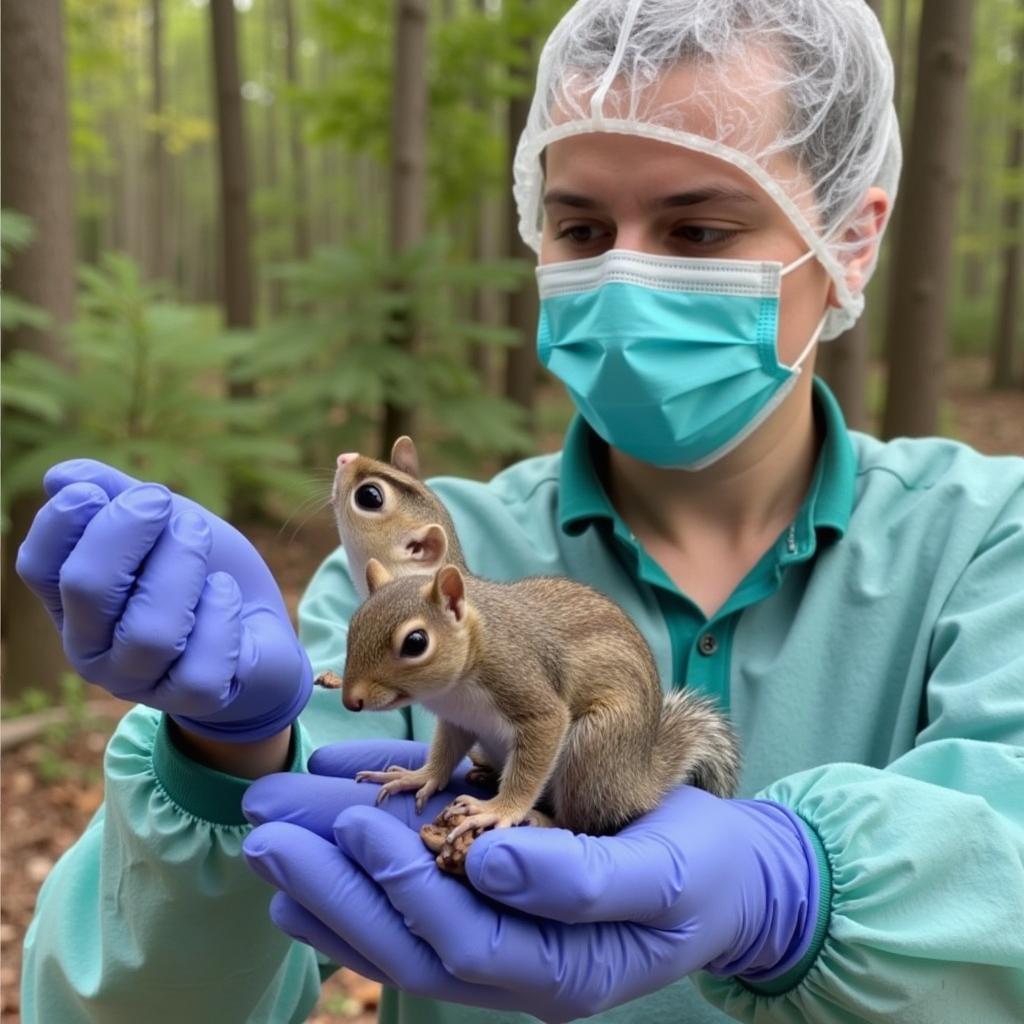Infant Squirrel Food is a critical aspect of caring for orphaned or injured baby squirrels. Knowing what to feed them, how to feed them, and recognizing the signs of a healthy, thriving squirrel are all essential for successful rehabilitation. This guide provides detailed information on proper infant squirrel nutrition and care.
Understanding the Dietary Needs of an Infant Squirrel
Baby squirrels have unique dietary requirements, and their food needs change as they grow. From newborn pinkies to weaned juveniles, each stage requires specific nutrients and feeding techniques. Understanding these stages is crucial for their survival. Incorrect infant squirrel food can lead to malnutrition, developmental problems, and even death.
The Importance of Species-Specific Formula
Never feed cow’s milk or human infant formula to a baby squirrel. These are not suitable infant squirrel food options and can cause severe digestive issues. Specialized squirrel formulas are designed to mimic the mother squirrel’s milk and provide the necessary nutrients for growth. These formulas are readily available from wildlife rehabilitators and some veterinary clinics.
How to Feed an Infant Squirrel
Feeding an infant squirrel requires patience and a gentle approach. Using the wrong technique can lead to aspiration or injury. Here’s a step-by-step guide:
- Warm the Formula: Ensure the formula is warmed to body temperature (around 100°F or 37.8°C). Test the temperature on your wrist before feeding.
- Use a Syringe: A small syringe without a needle is the best tool for feeding. Never force-feed.
- Position the Squirrel: Hold the squirrel upright, supporting its head and body.
- Feed Slowly: Introduce the formula slowly, allowing the squirrel to swallow at its own pace.
- Monitor Intake: Keep track of how much formula the squirrel consumes at each feeding.
Recognizing Signs of Dehydration and Malnutrition
Dehydration is a serious concern for infant squirrels. Signs include sunken eyes, lethargy, and dry mouth. If you suspect dehydration, contact a wildlife rehabilitator immediately. Similarly, malnutrition can manifest as slow growth, thin fur, and weakness. Proper infant squirrel food and consistent feeding schedules are essential to prevent these issues.
 Squirrel Rehabilitator Feeding Orphan
Squirrel Rehabilitator Feeding Orphan
Transitioning to Solid Food
As the squirrel grows, it will begin to show interest in solid foods. This transition should be gradual. Introduce small pieces of soft fruits, vegetables, and nuts. Ensure the pieces are small enough to prevent choking. Continue supplementing with formula until the squirrel is fully weaned. Observe the squirrel’s eating habits and adjust the diet accordingly.
When to Seek Professional Help
Caring for an infant squirrel is a significant undertaking. If you’re unsure about any aspect of their care, consult a licensed wildlife rehabilitator. They have the expertise and resources to ensure the squirrel receives the best possible care. Don’t hesitate to reach out for help.
“The most common mistake people make when caring for orphaned squirrels is using the wrong formula,” says Dr. Emily Carter, a wildlife veterinarian with over 20 years of experience. “Using a species-specific formula is vital for their health and development.”
Conclusion
Providing the proper infant squirrel food is crucial for their survival and development. Understanding their nutritional needs, employing correct feeding techniques, and recognizing potential health issues are key to successful rehabilitation. Remember, consulting with a licensed wildlife rehabilitator is always recommended for the best outcome for these vulnerable creatures. Always use appropriate infant squirrel food and never hesitate to seek professional help.
FAQ
- What should I do if I find an orphaned squirrel?
- Where can I find species-specific squirrel formula?
- How often should I feed an infant squirrel?
- When should I start introducing solid foods?
- What are the signs of a healthy infant squirrel?
- How can I tell if a squirrel is dehydrated?
- What should I do if the squirrel refuses to eat?
Have you checked out our no food or drinks signs?
For further assistance, please contact us at Phone Number: 02437655121, Email: minacones@gmail.com or visit our address: 3PGH+8R9, ĐT70A, thôn Trung, Bắc Từ Liêm, Hà Nội, Việt Nam. We have a 24/7 customer service team.